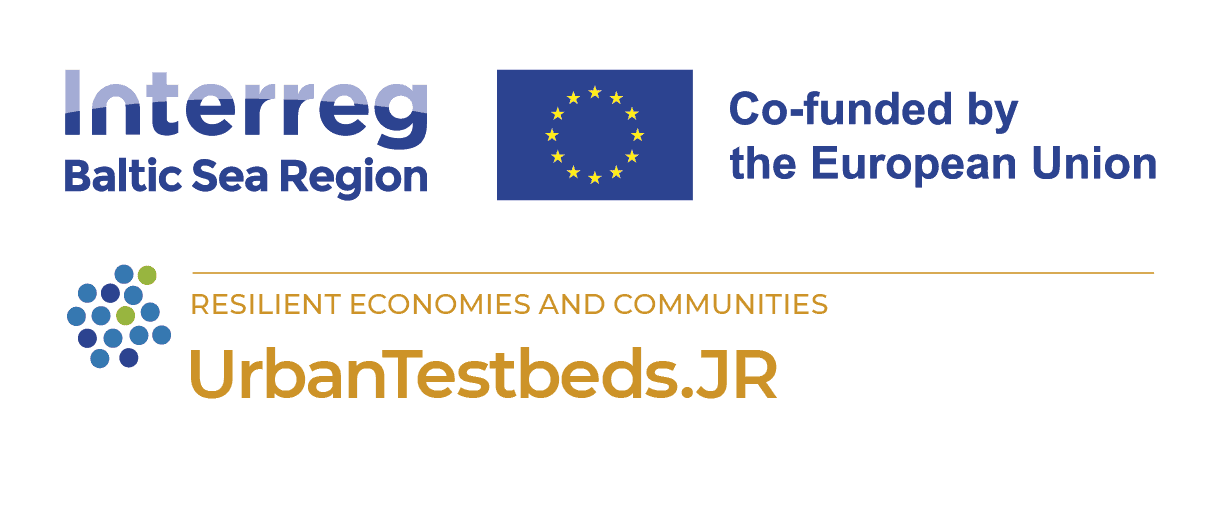Young Forum Open City
Project: UrbanTestbeds.JR
Physical Meeting
25. April 2024
10:00 - 16:30 (CET)

UrbanTestbeds.JR: Empowering Young Citizens to Shape a Sustainable Urban Future
Context and Challenge
UrbanTestbeds.JR emerged in response to a critical gap in urban development: the lack of meaningful engagement with young citizens in shaping the future of their cities. Across the Baltic Sea Region, communities face complex challenges such as climate change, urbanization, and sustainability. Yet, the voices of young people - those who will inherit these challenges - are often absent from decision-making processes.
The challenge: how can communities not only engage young citizens but also empower them to co-create solutions for a sustainable urban future? How can capacities be built in the community to engage young citizens? UrbanTestbeds.JR set out to tackle this by creating a framework that bridges the gap between young citizens, public authorities, and other stakeholders, ensuring that youth engagement becomes a cornerstone of urban development.
Solution
UrbanTestbeds.JR developed a comprehensive solution: the "Playbook - UrbanTestbeds.JR." This multi-perspective guide serves as a practical tool for engaging young citizens in urban co-creation processes. Designed for a diverse audience - including public authorities, educators, cultural institutions, and community organizations - the playbook provides actionable insights and methodologies to foster meaningful youth engagement.
The playbook is structured around key themes:
The playbook is not just a theoretical guide - it is a hands-on resource that equips users with tools to design workshops, analyse data, and create data-driven storytelling. It demonstrates how young citizens can be engaged in urban ideation, offering practical steps to ensure their voices are heard.
Impact
The project brought together a diverse coalition of stakeholders, including local public authorities, higher research institutions, cultural organizations, and community groups from Germany, Denmark, Sweden, and Latvia. Workshops conducted as part of the project engaged young citizens in co-creating solutions for local challenges, from reimagining public spaces. Bootcamps focused on the capacity building of the target groups in the local ecosystems. By bridging the gap between data, storytelling, and co-creation, the playbook has laid the foundation for a new approach to co-creative urban development - one that is inclusive, participatory, and future-focused.
The playbook is a call to action for communities across the Baltic Sea Region and beyond. It invites public authorities, educators, and organizations to adopt its methodologies, adapt them to their local contexts, and continue the work of empowering young citizens.
UrbanTestbeds.JR was led by HafenCity University Hamburg, in partnership with Aarhus University, Luleå University of Technology, and, along with Vidzeme University of Applied Sciences, municipalities and organizations such as the City of Hamburg, Aarhus Municipality, Luleå Municipality, Valmiera Municipality, Children’s Museum Hamburg, Code for Hamburg, ARIC Artificial Intelligence Center Hamburg, Central Library Hamburg, Coding Pirates Denmark, DOKK1 Central Library Aarhus, Teknikens Hus (Science Center) Luleå, and AI Sweden.
URBAN TESTBEDS.JR encourages experimentation as a significant means to build resilient communities. Focus is on the co-design of urban testbeds for tangible experiences in sustainability and climate mitigation action with and for young citizens. Aim is to strengthen the joint participatory capacity for young citizens, local public authorities and enabling interest groups. Participatory capacity is seen as a prerequisite to be inclusive in regard to a resilient community, here young citizens, to respond to climate and sustainability challenges. Experimentation includes urban testbed experimentation, service experimentation and experimental governance. The capacity building has three components: 1) Artificial Intelligence supported understanding and deconstructing of climate plans and their transformational goals/paths relevant for local experimentation, 2) Scoping tangible urban experimentation in testbeds, and 3) Storytelling the impact and perspective of the experimentation by means of data-based storytelling. Local authorities and interest groups in Germany, Denmark and Sweden will liaise with higher research institutions partners. Outcome will be a “Playbook for UrbanTestbeds.JR” with solution chapters on urban testbed identification & scoping, co-design sprints with young citizens for testbed scenarios and urban data storytelling, and an artificial intelligence solution module to support the understanding and deconstruction of climate and sustainability plans.
URBAN TESTBEDS.JR has launched capacity building by means of knowledge workshops and engagements in the activities “Young Citizen’s Engagement” and “Artificial Intelligence”. The knowledge workshops are staged across the participating four cities Hamburg, Aarhus, Luleå and Valmiera to share approaches and learnings. Hamburg introduced the citizens participation training sessions that have a unique training cycle regarding young citizens participation. The associate partner Children's Architecture Center Hochform participates to build their own capacity. Hochform and HafenCity University launched a joint children's engagement in regard to sustainable neighbourhoods topics and priorities in the context of the Architecture Summer. Luleå, with its Science Center Technikens Hus, introduced the method of engaging young citizens in urban planning and scenarios by means of Minecraft and simulation/role play. Aarhus introduced their activities and learnings from hands-on sustainability engagement in the city and the concept of digital neighbourhoods as a co-design approach. The library DOKK1 presented their sustainability activities with young citizens and their approach to digital engagements. Valmiera has designed a university course project for students identifying and communicating their peers' topics and priorities regarding sustainable neighbourhoods towards the municipality. In regard to the artificial intelligence module that targets the deconstruction of the local climate plans, the new developments around ChatGPT in its various forms have provided an extended approach in the sense that chat engagements of young citizens with the content of local climate plans are user friendly engagement methods. Hamburg and Luleå have included their respective associate partners ARIC (AI Center Hamburg) and AI Sweden.
Interactive map showing pilot locations. Use the arrow keys to move the map view and the zoom controls to zoom in or out. Press the Tab key to navigate between markers. Press Enter or click a marker to view pilot project details.